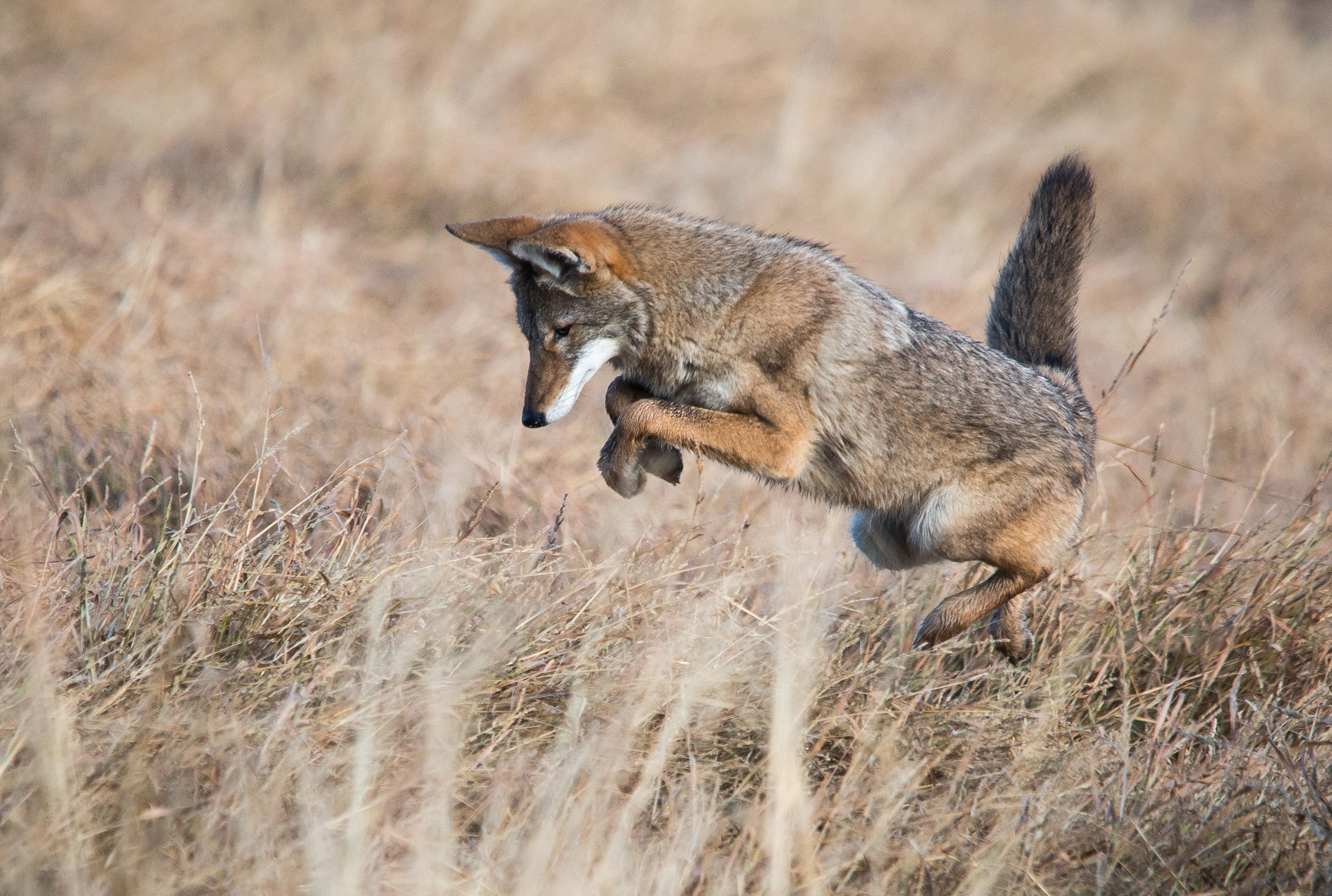 Pounce Courtesy Peggy Coleman
Pounce Courtesy Peggy Coleman
Why is a Carnivore Conservation Act Necessary?
Massachusetts (and the entire Northeast) is home to a hybrid of the western coyote and eastern wolf that scientists call the eastern coyote or “coywolf” as it potentially describes the animal more accurately than “eastern coyote” (Way et al. 2010, Way 2013). Regardless of genetics, these animals are beautiful, highly intelligent and social animals. Coyotes are called America’s song dogs.
Yet, most state governed “wildlife management programs” label coyotes as vermin or nuisance species. As such, the worst treatment is often reserved for them. In MA, “coyotes” (coywolves) may be killed almost half the year (October to March) in unlimited numbers (no bag limit) by anyone who buys a ~$30 general hunting license. People may open their windows and shoot them as they cross a yard (if they live 500 feet from another residence), they may place bait near their houses (or elsewhere) and then kill the animal as it approaches the bait. They may even do this at night. In MA, you can also train dogs to run, chase, and then eventually surround coyotes and foxes before they are shot.
A recent study found that coyotes are 100% monogamous and, therefore, remain with the same mate for their lives (Hennessy et al. 2012). Unrelenting hunting and persecution fragments their populations and disrupts their families. No consideration is given to the unique social structure of coyotes and their interdependence on one another (Way 2007). Most biologists agree that unrelenting hunting and persecution not only fragments coyote populations and disrupts their families, but it does not reduce their populations. Hunting coyotes is proven to be ineffective as a management method and perpetuates a vicious cycle of killing and often does not reduce populations in localized areas, which is generally the intended reason for control actions in the first place (Way et al. 2009, Way 2010).
Like coyotes, grey and red foxes may also be baited and hunted with dogs. For foxes, there is no limit or quota; they are hunted over many months and through most of the female’s gestation period. In Massachusetts, predator hunters may use animal distress calls that imitate injured wildlife to attract carnivores. On investigation by the carnivore, the hunter kills it. Both foxes and coyotes may be tracked and killed by packs of dogs. While bobcats and bears are specifically protected from hounding and baiting due to the 1996 Wildlife Protection Act, some hunters track bobcats through the snow and despite the relatively small population of bobcats in the state they too can currently be hunted and killed with no quota for about 3 months a year.
The most recent scientific peer-reviewed literature warns us that the greatest threat to ecological integrity is presented by a loss of apex predators (Stolzenburg 2008, Ripple and Beschta 2011, 2012). When we loose apex predators like wolves, coyotes, mountain lions, bears and other carnivores, ecosystems suffer from what is termed a “trophic cascade” effect. Quite simply taking out the top predators causes the animals and plants within a particular system to suffer. By relentlessly hunting coyotes, fox, and bobcats we ignore all the collective knowledge that we have gained over centuries from people like Charles Darwin, Rachel Carson and Jane Goodall. Science and its most eloquent advocates have taught us that each and every organism plays a role in nature. Eastern coyotes, foxes, and bobcats fulfill an equally significant role in the ecology of Massachusetts including a likely relationship to keeping rodents and deer ticks that cause Lyme disease suppressed.
As natural habitat in Massachusetts and nationwide shrinks from human development, skunks, raccoons, foxes, bobcats, and coyotes are forced to live near people in increasing numbers and densities. Yet there are easy ways to coexist with these animals. Learning to live with carnivores, as well as other species, keeps our ecosystems (including urbanized ones) healthy. We enjoy unsurpassed natural beauty and relative open spaces in Massachusetts and in other states that support native carnivores. Its time we share these luxuries with other wild animals that also live here. The unrelenting killing of carnivores makes Massachusetts and America less special.